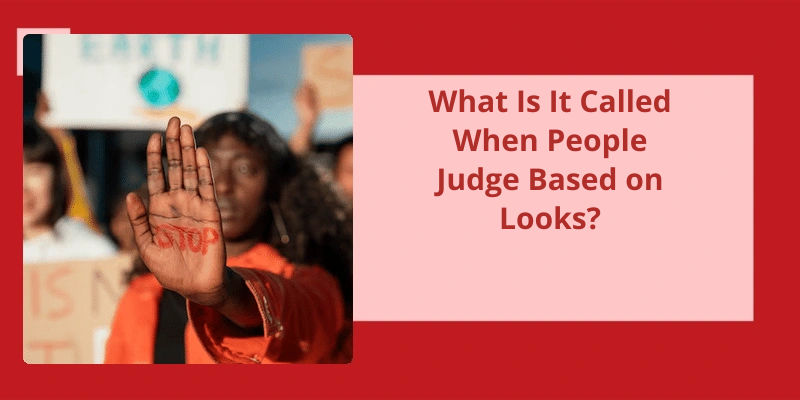Throughout human history, people have been judged and classified based on their physical appearance. This practice of assessing someone's character or personality based on their facial features, body shape, or other physical traits is commonly known as physiognomy. While it may seem like an outdated or archaic concept, the truth is that physiognomy still plays a role in modern society, albeit in subtler ways. From job interviews to dating apps, people continue to make assumptions and draw conclusions about others based on their looks, despite the fact that we know these assessments are often inaccurate and unfair. But where did this idea of judging people by their appearance come from, and why does it persist? To answer these questions, we need to delve deeper into the history and psychology of physiognomy.
What Is the Word for Judging People Based on Looks?
Physiognomy is a term used to describe the practice of judging a person based on their physical appearance, usually their facial features. This practice has been around for centuries and has often been used to classify people into various categories based on their supposed character traits. For instance, people with strong jaws were thought to be aggressive, while those with small eyes were considered untrustworthy.
One of the dangers of relying on physiognomy to judge people is that it can lead to discrimination and stereotyping based on appearance alone. This can result in unfair treatment of individuals who may not conform to societal expectations of what’s considered attractive or desirable. It can also lead to a narrow-mindedness that prevents people from seeing the unique qualities that each individual possesses.
In some cases, physiognomy has been used to justify racism and classism. For example, during the 19th century, scientists used physiognomy to study the physical differences between different races and to conclude that some were superior to others. This type of thinking perpetuated discrimination and prejudice that continues to affect societies today.
It’s important to recognize that appearances can be deceiving and that what lies beneath the surface is often more valuable than what can be seen on the outside. We must strive to judge others based on their actions and character rather than their physical appearance. By doing so, we can create a more tolerant and accepting world for all.
As much as we try to avoid it, judging others by their appearance can be ingrained in our social behavior. In fact, a recent survey showed that a large majority of people believe that everyone judges others based on their physical appearance. So, why do we do it and how does it affect us and those around us? Let’s explore further.
What Percentage of People Judge by Looks?
It’s understandable that we make snap judgments based on appearances. After all, we’ve evolved to quickly assess threats in our environment and respond accordingly. However, this natural instinct can lead to unfair and inaccurate judgments of others, particularly when it comes to physical appearance. Research has shown that people tend to make assumptions about a persons intelligence, personality, and even their competency based on their appearance, despite no factual evidence to support these claims.
This societal bias towards physical appearance can be damaging, particularly for those who don’t conform to traditional beauty standards. People who’re overweight, have disabilities, or simply don’t fit into the mold of what’s considered conventionally attractive are often unfairly judged and discriminated against. This can have a profound impact on their self-esteem, mental health, and overall well-being.
It’s not just our own biases that lead us to judge others based on their appearance. Society as a whole places a great deal of importance on looking a certain way, from personal grooming and fashion choices to plastic surgery and extreme diets. The media is full of images of perfectly airbrushed bodies and flawless faces, creating unrealistic expectations for what we should all look like. It’s no wonder that so many people feel self-conscious and judged on a daily basis.
While it’s impossible to completely rid ourselves of our natural tendency to judge based on appearances, we can strive to be more conscious of these biases and work to overcome them. By challenging our own assumptions and learning to appreciate people for who they are, rather than how they look, we can create a more inclusive and accepting society. After all, true beauty comes from within, and it’s time we start recognizing and celebrating that fact.
The Impact of Physical Appearance on Job Opportunities and Career Success
- Studies have shown that physical appearance can have an impact on job opportunities and career success.
- Attractive individuals tend to have a higher chance of getting hired and receiving promotions.
- People who’re perceived as physically fit are also often viewed as having more discipline and work ethic.
- While it’s important to focus on job skills and qualifications, it’s also worth considering the role that physical appearance may play in the hiring process.
- It’s important to note that discrimination based on physical appearance isn’t acceptable in the workplace, and employers should focus on hiring and promoting based on merit rather than superficial traits.
Despite our best efforts to look beyond the surface, it’s human nature to judge others by their appearance. But is it okay to do so? While facial features can reveal certain traits about a person, such as sociability, relying solely on appearances can lead to inaccurate judgments and biased decisions. In this article, we’ll explore the implications of judging someone by their looks and how we can move beyond the superficial to make fair, informed assessments of those around us.
Is It OK to Judge Someone by Their Looks?
The debate surrounding the issue of whether it’s alright to judge someone by their looks has been an ongoing one for quite a while now. People typically use physical appearances to make quick judgments about others, but this practice has come under scrutiny in recent years. Is it ethical to base decisions on how someone looks?
In a recent paper published in the Journal of Personality and Social Psychology, researchers have found that individuals are more likely to rely on physical appearances when judging personality traits related to sociability. This includes traits such as extraversion and friendliness. However, physical appearances only provide limited information about an individuals personality, meaning that judgments based on these attributes alone are usually inaccurate.
Making judgments based solely on appearances can often lead to biased decision-making. Physical features can vary widely across different cultures and ethnicities, and relying on them can lead to discriminatory outcomes. Therefore, it’s important to be aware of ones inherent biases and to take steps to challenge them when necessary.
The practice of judging someone by their looks can also have negative mental health implications. Being aware that one is being judged based on their physical appearance can be incredibly stressful and lead to low self-esteem and anxiety. It can be difficult for individuals to move past this kind of stigma and can, in turn, affect how they interact with others.
People are complex creatures and can never be wholly defined by their appearance. Therefore, it’s essential to look beyond the surface and strive to understand individuals on a deeper level before making judgments that can have long-lasting repercussions.
Source: Is it nice to judge people based on their looks?..
What Does the Bible Say About Judging People by Appearance?
2 In other words, humans have a tendency to judge others based on how they look, while God focuses on whats inside a person. This is an important lesson that’s repeated throughout the Bible because it reminds us that we shouldn’t let appearances deceive us.
There are many examples in the Bible where people were judged wrongly due to their appearance. For instance, in the Old Testament, Samuel was sent to anoint one of Jesses sons to be the next king of Israel. When he saw Jesses son Eliab, he thought he was the one because he was tall and handsome. However, God told Samuel: “Look not on his countenance, or on the height of his stature; because I’ve refused him: for the Lord seeth not as man seeth; for man looketh on the outward appearance, but the Lord looketh on the heart. 3 Samuel then anointed David, who was the youngest and least likely candidate, but had a heart after God.
Jesus also warned against judging people by appearance when he said: “Judge not according to the appearance, but judge righteous judgment. 4 He was speaking to those who were quick to judge him based on his humble beginnings and perceived lack of education. But Jesus had come to save the world, regardless of his background.
In the New Testament, Paul advised Christians to “be not conformed to this world: but be ye transformed by the renewing of your mind, that ye may prove what’s that good, and acceptable, and perfect, will of God. 5 In other words, Christians shouldn’t adopt the worlds standards of judging others by appearance or other superficial qualities. Instead, we should focus on what truly matters, which is a persons heart and character.
We should strive to see others as God sees them, rather than letting outward appearances influence our opinions of them. By following these teachings, we can learn to live more selflessly and compassionately, treating all people with the love and respect they deserve.
Examples of People in the Bible Who Were Judged Positively or Negatively Based on Their Appearance
- Eve: negative judgement based on her physical appearance when she ate the forbidden fruit and realized she was naked (Genesis 3:6-7)
- King Saul: positive judgement based on his physical appearance when the prophet Samuel saw him and declared him to be the chosen one to be king (1 Samuel 9:2)
- Queen Vashti: negative judgement based on her refusal to appear before King Xerxes when summoned to show off her beauty (Esther 1:11-12)
- David: positive judgement based on his heart, despite his physical appearance being described as “ruddy, with a fine appearance and handsome features” (1 Samuel 16:12)
- Job: negative judgement based on the physical afflictions that he endured, which caused him to be ridiculed and shunned by his friends (Job 2:11-13)
Conclusion
In conclusion, physiognomy, the act of judging someone based on their physical appearance, has been a controversial topic throughout history. Despite numerous studies showing that it isn’t a reliable way to predict one's character or abilities, many individuals still base their judgments on looks alone. This type of prejudice can have harmful effects on individuals and society as a whole. It’s important to recognize the negative impact of physiognomy and instead prioritize getting to know people for who they’re rather than what they look like. Only then can we break down barriers and build a more inclusive and understanding world.






